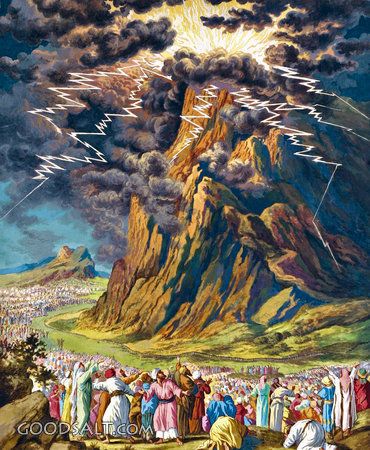
The Bible talks a lot about the fear of God, but I would guess that most of us don’t understand what it means. Usually, when we hear the word fear we think of being terrified of something. Therefore, since we don’t want people to think that they should be afraid of God, we soften the word and say that the fear of the Lord only means that we should be in awe of Him and revere Him.
However, the word used for “fear” in both the Greek (phobeo) and Hebrew (yirah) can mean to have a fear or dread, to be terrified, or to be in awe and show reverence. So, the question is, does the fear of the Lord mean only to revere God or does it include dread and terror? Of course, many books and articles deal with this subject at length, and it is not my intention to delve into the subject that deeply here. I do, however, want to present some thoughts on the fear of the Lord that might help bring some clarity.
First, let’s begin with Exodus 20:18-21. In this passage, God had just revealed Himself to Israel on Mt. Sinai with thunder, lightning, trumpet soundings, smoke, and verbally giving the Ten Commandments. The people’s response is that they “trembled and stood afar off” (verse 18). They also told Moses to not let God speak to them again because they did not want to die (verse 19). Moses’ response was “Do not fear; for God has come to test you, and that His fear may be before you, so that you may not sin” (verse 20). Here, Moses is saying that God does not want them to be afraid of Him, but He wants them to fear Him, and he uses a form of the same word (yirah) in both instances. What is the difference? How can we tell if we are afraid of God or if we fear Him? One way we can tell is by looking at the responses of Moses and Israel to God’s presence on Sinai.
Israel, because they were afraid of God, drew back from the presence of God because they were afraid of dying. Their focus was on “What will happen to me?” so they didn’t want to go any further with God. Moses, on the other hand, drew closer to God (verse 21). His desire was to experience more of God’s presence and was not concerned about his own life (see Ex. 33: 12-23). A person who is afraid of God is not concerned about growing closer to God but only about what will happen to him, but one who fears the Lord will hunger for more of God’s presence.
Second, in Isaiah 6:1-7, Isaiah had a vision of the Lord on His throne. He saw the glory of God and the angels crying, “Holy, Holy, Holy is the Lord of hosts; the whole earth is full of His glory!” Isaiah’s response was one of humility and repentance. He cried out “Woe is me, for I am undone! Because I am a man of unclean lips…” His experience in the holy presence of God made him aware of his sinfulness and he repented and was cleansed (verses 6-7).
Compare this with what Jesus says in John 3:16-21. Here, Jesus talks about God sending Jesus as a light into the world to save the world. However, some do not receive the light because they love their sin more than they love the light and they don’t want their sin to be exposed (verse 19-20). A person who is afraid of God, then, does not want to grow closer to God because they don’t want to give up their sins, while a person who fears God is willing to humble themselves and repent whenever the light of God’s presence exposes their sin because they love God more then they love their sin.
Finally, let’s consider Nadab and Abihu in Leviticus 10:1-3. God gave Aaron specific instructions about the altar of incense (Ex. 30:1-10). The altar of incense was to be dedicated for incense only and not for any other offerings (Ex. 30:9), and the fire for the incense was to be taken from the altar of burnt offering outside the sanctuary (Lev. 16:12). Nadab and Abihu, however, did not follow God’s direction but used unauthorized fire for the incense. Because they did not revere God enough to follow His directions, fire from the Lord came down and consumed them. God responded by saying that anyone who comes near Him must regard Him as holy and He must be glorified before all the people (Lev. 10:3).
We see a similar situation in Acts 5:1-11 when Ananias and Sapphira sold some of their property to give the money to the apostles to be used for the needy. However, they kept back part of the money for themselves and lied about the amount that they received for the land (verse 3). Again, just as with Nadab and Abihu, Ananias and Sapphira did not recognize how awesome and majestic God is nor value Him enough to treat Him with the honor and respect He deserves that they thought nothing of lying to Him. They devalued Him and did not take sin or God’s judgment seriously.
Wouldn’t doing this mean, though, that they were not afraid of God because they were not afraid of what He would do to them? Actually, this is a result of being afraid of God. When a person is afraid of God, they don’t want to face who He truly is. They don’t want to face His power because it is far more than they could imagine, and it frightens them. They don’t want to face His holiness because they don’t want their sins to be exposed. They don’t want to face His righteousness and judgment because they would have to obey Him and could not do what they wanted to do. Therefore, because they are afraid of who God really is, they create a milder, less powerful, less threatening god. Their focus is on saving themselves. A person who fears God, though, has had an encounter with the glory and holiness of God and, instead of backing away, they hunger for more of His presence. They allow His holiness to expose any sin that would hinder them from growing closer to Him, and they humbly confess those sins allowing Him to cleanse them. They also recognize His power and majesty and give Him the honor and reverence He deserves through their praise and obedience. Their focus is on knowing God and glorifying Him.
